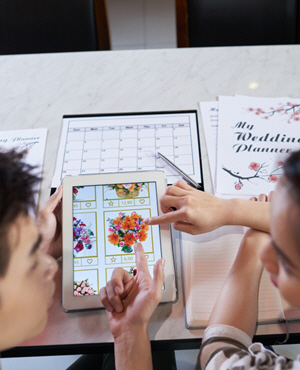Getting married is a big deal. In fact, committing the rest of your life to your partner is quite possibly the most serious choice you will ever make.
Now, this isn’t news. You’ve likely been hearing how big of a decision marriage is since the moment you got engaged. And after the 50th random piece of unsolicited advice, you probably started blowing these suggestions off.
You might have known your partner for quite a while. Perhaps you spend a ton of time together and practically feel like you’re married already. There’s not much you feel will change once you have a ceremony and sign a piece of paper. But every once in a while, you think about some of the things you and your partner fundamentally disagree on. They don’t come up every day, or really very often at all, but when they do you’re shocked at just how different the two of you can be.
 Sometimes you just wonder if there are certain things you would like to connect more on
Sometimes you just wonder if there are certain things you would like to connect more on
Your relationship definitely isn’t in a bad place or you wouldn’t be committing to walking down the aisle. You just wonder sometimes if the two of you need to pay extra attention when these discrepancies pop up. Or, if you should talk to a professional before you say ‘I Do’ just to work out the kinks.
Unfortunately, when couples ignore what seem like small differences before they get married, there’s a higher chance that they can turn into bigger problems over the course of a decades-long relationship. A great example of this is when couples brush off communication challenges. What may seem like poor word choice or a stoic personality could turn into problems expressing feelings after years and years of relationship tension.
The downside to this is that less significant relationship challenges that could have easily been addressed before marriage are left to fester and can grow more significant over time. So, when engaged couples don’t exactly know the best ways to talk to each other – and brush off building good communication skills thinking they’ll figure it out as they go – they might be setting themselves up for unhealthy conflict down the road.
Perhaps for you and your partner, it’s difficult to talk about planning your wedding when it comes to your extended families. Both of you have relatives who don’t get along and it’s hard to make sure that every aunt, cousin, and grandparent’s need are being met while the two of you are trying to meet your own. You may have had disagreements about seating charts and family traditions and sometimes you just have to drop the subject.
But it’s not necessarily what you are disagreeing about that bothers you, it’s the way you disagree. Both of you use language that is inappropriate and sometimes you attack each other instead of focusing on what really has the two of you upset. Unfortunately, all this does is drive a wedge between the two of you rather than provide you with an opportunity to unite over a common annoyance.
Eventually if you and your partner continue to push away the small challenges between you, there’s a chance they can turn into something bigger. Luckily, there is an easy way for you to get in front of any issues while they are less significant and to keep them from growing.
 Enter: Premarital Counseling
Enter: Premarital Counseling
You might be thinking that premarital counseling is only for people who are especially religious, or for those who have real problems they are trying to work out. But, in reality, premarital counseling goes a long way for engaged couples who are already on a great path.
The truth is, it’s completely normal for a lot of engaged couples to be nervous about getting married or to have reservations about seeing a therapist. But going to couples counseling before you officially get married in no way means you are incapable of fixing your own problems or that your relationship is going to fail. Really, it means that you are taking a proactive stance and ensuring that your relationship is starting out on the right foot. The quicker you clear the air about anything that is bothering you, the sooner you will get to the root of your challenges.
If you and your partner skip premarital counseling
As the months and weeks draw down to your wedding, you and your partner are likely to be under a lot of stress. It’s inevitable that something will go wrong with a wedding party member’s flight, the caterer’s order, or your final dress fitting. As the stressful situations pile up, it’s also likely that you will be having more and more tense conversations.
What’s worse, is that any negative communication patterns that have emerged over the course of your relationship have the potential to come roaring out, especially when the tension is high. The downside to this is that the time when the two of you should be experiencing your most bliss has the chance of being the time you experience your most conflict. Your big day could be overshadowed by disagreements or concerns about your future and you may start to withdraw from each other.
If you decide to do premarital counseling
Even though it can seem counterintuitive to involve a therapist when your relationship is mostly doing fine, sometimes it is the preventative maintenance that makes the biggest difference. Solidifying your relationship’s happy, healthy foundation now will go a long way when significant struggles or challenges come up down the road.
One of the biggest upsides of visiting with a professional before getting married is the chance to air any and all grievances before you commit. Together, the two of you can explore anything that’s bothered you in a safe and unbiased place. Another benefit is the opportunity to receive unbiased feedback on your relationship and to learn and practice skills to improve your communication.
When you and your partner choose to invest in your future ahead of time, you are signaling to each other that you’re invested in starting your marriage off right. By seeking premarital counseling, you are taking the opportunity to maximize your chances at a happy relationship for years to come.
 Here are six reasons you and your partner could benefit from premarital counseling:
Here are six reasons you and your partner could benefit from premarital counseling:
- Determine Your Strengths and Your Challenges
Every relationship has its own strengths and weaknesses. There are things you and your partner do extremely well as a couple and a few that you already struggle with. Having a firm understanding of your strengths and weaknesses as a couple will help you understand how to navigate the ups and downs of marriage before you even walk down the aisle. Being able to identify what might set you off or cause you to argue and having a plan in place to address the argument in a healthy way will prevent both of you from causing unnecessary damage to your relationship.
- Improve Communication Skills
As you and your partner engage in premarital counseling sessions, your natural communication patterns will emerge. By familiarizing yourselves with the similarities and differences in your communication styles you will gain better understanding of where partner is coming from. Both of you will also be able to identify what language may cause an argument and how to talk to each other to keep a disagreement from turning into a full-blown fight. When couples come to Connecticut Integrative Counseling they work together to learn as much as they can about each other, practice new communication skills, and even have the opportunity to complete homework outside of session, if requested.
- Navigate Family Dynamics
It’s impossible that you and your partner had the exact same upbringing. Even if the two of you are from similar backgrounds, your interactions with your family members had a profound impact on your outlook on life and your outlook on marriage. The truth is, every experience from your past has shaped you in one way or another. And while this “baggage” doesn’t always have to be negative, you and your partner will benefit greatly if you can learn the ways that your experiences have defined you and how you bring them into your current relationship.
- Identify Value Systems and Beliefs
A lot of times when you’re in the newer phases of a relationship, its easy to gloss over small differences of opinion. The honeymoon stage keeps you feeling madly in love and it’s as if your partner could do no wrong. But over time, these differences can become more apparent and start to feel more important. Especially as you get married and start a family. Issues you might have thought weren’t important like political beliefs, religious views, or parenting techniques suddenly seem much more significant. When couples come in for premarital counseling, we take time to get to the root of these beliefs and how they might impact a marriage for years to come.
- Focus on Having Fun as a Couple
Premarital counseling doesn’t have to be negative or stuffy. Sometimes couples just need a safe place to get away from everything that is causing them stress and enjoy getting to know each other on a deeper level. Learning what makes your partner tick and how to genuinely support and collaborate with them for years to come can feel pretty great.
- Ask for and Accept Help
There are going to be situations that come up in your marriage that could be potentially challenging or painful. You and your partner might feel embarrassed or ashamed and those feelings could keep you from reaching out to people who could help you through a tough situation. When you seek premarital counseling, you are beginning your marriage with the idea that you and your partner can always go somewhere for help. Really, you’re making the commitment to always strive for a better marriage. When you and your partner schedule a premarital counseling session with me, you will be partnering with a dedicated professional who wants to see your marriage thrive.
It’s true you and your partner might be in a great place right now and your relationship may be thriving. But there may also be little things you are allowing to fall through the cracks because they feel small and insignificant. When you schedule a premarital counseling session, you will find the support and guidance you need to safely explore these little things and to create a plan to keep them from ever turning big in the future.
If you and your partner are interested in premarital counseling, please contact me.


